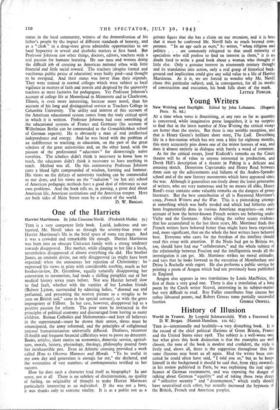Young Writers
AT a time when verse is flourishing, at any rate so far as quantity is concerned, while imaginative prose languishes, it is no surprise to find that in the latest number of New Writing the critical essays are better than the stories. But there is one notable exception, and that is Henry Green's brilliant short story, The Lull. Describing life in a fire-station which has not seen a blitz for eighteen months, this story accurately pins down one of the minor horrors of war, and does it almost entirely in dialogue with barely a word of comment
As for the critical essays, Josef Kodicek's remarks on the Czech theatre will be of value to anyone interested in production, and Derek Hill's description of a theatre in Peking is a delicate and amusing sketch. Demetrios Capetanakis and Henry Reed between them sum up the achievements and failures of the Auden-Spender school and of the new literary movements which have appeared since the war. Although it generalises too freely about the latest generation of writers, who are very numerous and by no means all alike, Henry Reed's essay contains some valuable remarks on the dangers of group literature. But the best contribution of all is Raymond Mortimer's essay, French Writers and the War. This is a painstaking attempt at something which was badly needed and which had hitherto only been fragmentarily done in various American magazines—an exact account of how the better-known French writers are behaving under Vichy and the Germans; After sifting the rather scanty evidence
Drieu la Rochelle with regret. He also performs a public service by printing a poem of Aragon which had not previously been published in England.
Aragon also appears in two translations by Louis MacNeice, the first of them a very good one. There is also a translation of a long poem by the Czech writer Nezval, interesting in its subject-matter but very difficult to read. Roy Fuller contributes four sincere but rather laboured poems, and Robert Graves some partially successful






















 Previous page
Previous page